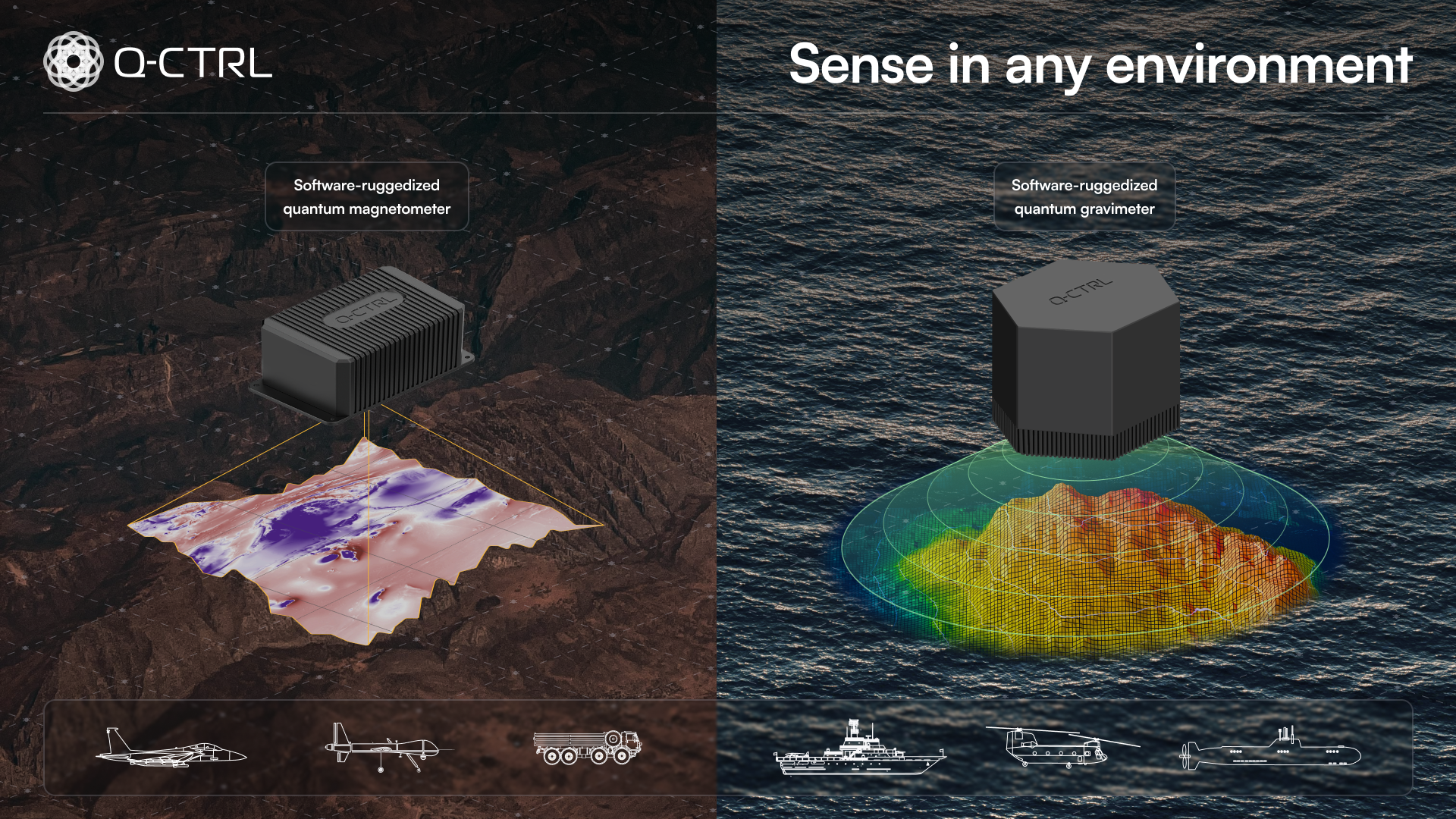DARPA Selects Q-CTRL to Develop Next-Generation Quantum Sensors for Navigation on Advanced Defense Platforms

Funding will support quantum-based navigation technologies in collaboration with Lockheed Martin.
SYDNEY, AUSTRALIA – August 27, 2025 – Q-CTRL, the global leader in quantum infrastructure software, today announced its selection for two awards under DARPA’s Robust Quantum Sensors (RoQS) program. With this selection, DARPA has awarded Q-CTRL contracts valued at A$38M (US$24.4M) to augment Q-CTRL’s field-validated quantum sensing technologies for demanding real-world use cases in high-performance military vehicles.
Navigational technology that is resilient to denial, jamming, spoofing, and other denials in the environment has become increasingly critical to defense applications from battlefield operations to intelligence and surveillance. With conflict zones expanding, the risks to crewed and uncrewed defense missions are growing daily. Quantum sensing offers a complementary solution to GPS that is resilient against external interference while filling coverage gaps.
Q-CTRL will develop next-generation quantum sensors for navigation based on their success in field trials of airborne, maritime, and ground-based quantum navigation augmented by their proprietary AI-powered software ruggedization. This technology enables sensors to operate reliably on moving defense platforms subject to challenging real-world conditions, without the need for traditional shielding or isolation. Q-CTRL will be joined by Lockheed Martin as a subcontractor on one aspect of the RoQS program, leveraging its expertise in GPS and quantum technology.

RoQS was established by DARPA to accelerate the development, testing, and validation of quantum sensors for real-world defense applications, which include maintaining stability against environmental interference, mechanical vibrations, and heavy g-forces.
DARPA has an incredible track record of delivering innovations that change the face of society, from the internet and mobile phones to night vision and stealth. We’re honored that our recent demonstrations and exciting new ideas earned Q-CTRL’s selection to deliver a new generation of software-ruggedized quantum sensors for the most challenging defense missions. We’re here to win and are excited to work with the team at DARPA for the benefit of the warfighter. Michael J Biercuk, CEO and Founder of Q-CTRL.
We look forward to supporting Q-CTRL and DARPA in the development of robust quantum-enhanced navigational technology. This award signifies the priority defense agencies are placing on the potential for quantum navigation solutions to deliver transformational national security capabilities that complement GPS. Thomas Loftus, Senior Fellow at Lockheed Martin.
Some sectors and organizations are fast-maturing quantum navigation for use on land, sea, in space, and in the air. The aerospace industry is actively exploring the potential for magnetic navigation technologies, with companies like aircraft manufacturer Airbus pursuing their development.
Additionally, Q-CTRL’s programs target the complementary missions of geophysical mapping of gravity and magnetic fields, as well as positioning based on matching detected signals to the pre-generated maps. This approach provides huge advantages in navigational missions and delivers new insights into minerals prospecting and underground target detection.
USGS, NASA, and other Federal Agencies are exploring how to use the emerging generation of highly capable, mobile quantum sensors to detect and assess mineral deposits, and to map out detailed subsurface patterns for GNSS-denied navigation. DARPA's awards to Q-CTRL illustrate the potential for impactful new use of this technology, and NASA looks forward to pursuing a deeper relationship with Q-CTRL. Jonathan Stock, Chief Scientist for Innovation, NASA Ames Intelligent Systems Division.
Ironstone Opal, the company’s quantum-assured navigation system, recently outperformed a high-end inertial navigation system (INS) in flight for the first time, achieving up to 111x greater positioning accuracy when GPS was unavailable – a significant step forward for real-world applications of quantum sensing to defense missions. In these tests, the company’s proprietary AI-driven, software-level innovation was the key to the removal of platform interference.
Ironstone Opal’s navigation system was also recently validated in maritime trials on board the Royal Australian Naval vessel, MV Sycamore.
In March, Lockheed Martin and Q-CTRL were awarded a contract by the U.S. Department of Defense's Innovation Unit (DIU) to prototype a quantum-enabled Inertial Navigation System (INS).
Visit Q-CTRL's website to learn more about Ironstone Opal and to request more information about evaluation kits for crewed aviation use cases.
About Q-CTRL
Q-CTRL is a key player in the global quantum technology industry as a category-defining business for AI-driven quantum infrastructure software. Leading quantum computing hardware providers integrate its performance-management software with their superconducting and silicon-based platforms to deliver unprecedented capabilities to end users. The company’s global leadership in quantum sensing for defense and dual-use was featured in The New York Times. Q-CTRL also developed Black Opal, an award-winning edtech program that enables users to learn quantum computing quickly.
Founded by Michael J. Biercuk in November 2017, Q-CTRL has assembled the world’s foremost team of expert quantum-control engineers, providing solutions to global quantum technology leaders, including Fortune 500 companies, startups, national research labs, and academic institutions. The company has international headquarters in Sydney, Los Angeles, San Francisco, Berlin, and Oxford.



